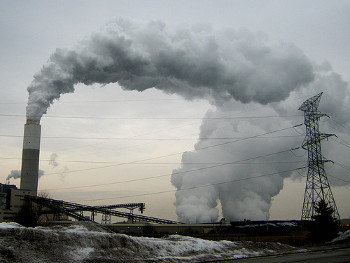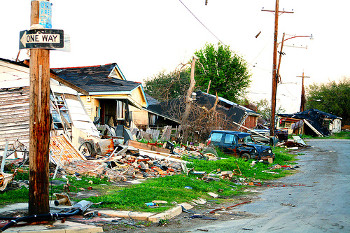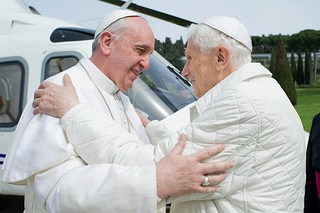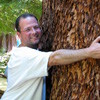
Happy Earth Day!
When I first heard about Earth Day in the early 1990’s I was convinced that science-fiction junkies like myself had finally been heard. I was so excited that the “final frontier” would be honored in such a direct and poignant way. I fully expected celebrations of the other planets as well: Jupiter Day, Mars Monday, or even Saturn-day. And why stop there? As a huge fan of Doctor Who, I secretly held out hope for a Skaro Sunday or a Gallifrey Day.
As a science-fact junkie as well, I was only slightly disappointed when I quickly realized that Earth Day was really about the environment. The concept of global climate change was still new and controversial in the early 90’s. But today, 97% scientists not only believe the Earth’s climate has warmed in the past century, but also believe that this warming is due to human activity.
Global warming results from the accumulation of gases, some human-generated, that trap heat in Earth’s atmosphere. The primary gas is carbon dioxide, released from burning coal, oil and gas. The second is methane, released from rice paddies, both ends of cows, rotting garbage in landfills, mining operations, and gas pipelines. Third are chlorofluorocarbons (CFCs) and similar chemicals, which also contribute to the separate problem of ozone depletion. Nitrous oxide from fertilizers and other chemicals comes in fourth. Because of the human element, global climate change is an ethical issue.
When I taught Human Ecology for non-majors at Gonzaga University, our textbook introduced what it called the “Seven Ecological Maxims.” The maxims are not officially recognized or referenced by ecologists in their research. They simply represent a quick and easy way for the textbook to organize some commonly held views on how the ecological world works. In the course, we not only covered ecological concepts, but also delved into sociological concepts. Lacking an introductory Sociology textbook with its equivalent set of maxims, but equipped with experiences of working with people in different parts of the world, I came up with my own “Sociological Maxim”: In any disaster the poor always suffer disproportionally the most. I can’t patent this “maxim” as my own because I’m not the only one that believes this.

“…97% scientists not only believe the Earth’s climate has warmed in the past century, but also believe that this warming is due to human activity.”
World Bank President Jim Yong Kim notes the impact global climate change will have on the poor: “It is the poor, those least responsible for climate change and least able to afford adaptation, who would suffer the most.” The bank recognizes that “climate change disproportionately threatens the African and Asian nations that would find it hardest to cope” and promises to find ways to eliminate poverty.
You see, scientists tell us that global climate change will result in more extreme weather conditions on the planet. Some areas will experience more severe droughts while others will experience greater flooding. Blizzards, hurricanes, and typhoons promise to be more powerful. Some of these disasters will be “natural” in the sense that would have occurred with or without human activity. But others will be “unnatural” – human activity will have caused them or at least contributed to their severity. In either case, the victims who will suffer the most will be the poorest.
The United Nation’s 2013 Human Development Report warns that, “the number of people living in extreme poverty could increase by up to 3 billion by 2050 unless urgent action is taken to tackle environmental challenges.” The report continues, “climate change is already exacerbating chronic environmental threats, and ecosystem losses are constraining livelihood opportunities, especially for poor people” and makes an ethical conclusion that, “a clean and safe environment should be seen as a right, not a privilege.”
A severe drought in the Yunnan province in China promises to continue with climate models showing changing rainfall patterns and predicting “a possible decrease in precipitation in the south over the next 20 years.” Again, it’s the poor who suffer the most. Consider 46-year old farmer Zhu Chunquan who everyday walks almost 10 miles every day through the mountains of Southwest China to get water for his family.
Closer to home, consider the disproportionate impact Hurricane Sandy had on Caribbean nations such as Cuba and Haiti. After getting slammed by a level 5 hurricane, environmental activist Paul Mayer reported that Cubans “still have no electrical power after two weeks, while parts of New York City lit up after four days. Haiti, one of the world’s poorest countries, was also devastated.”
Hurricane Katrina had a similar impact in the United States. The United Nations Habitat report describes how most inhabitants of New Orleans could flee the storm using the highway evacuation route. But what options did those without cars or cash have? These folks were forced to find “shelter under freeway bridges, in the city’s sports arena, and in the nearby convention centre for days until help arrived.” The post-hurricane pictures and videos shocked our nation: “Reporters covering the scene likened it to something more akin to war-torn Somalia or post tsunami Indonesia than a scene from one of the world’s wealthiest nations.”
The Catholic Church, concerned about God’s Creation and the poor, has also responded to global climate change. The United States Conference of Catholic Bishops, explaining why the Church cares about the environment, applies Catholic Social Teaching to show how concern for the environment calls for the respect of human life and dignity, the promotion of the common good and “a special responsibility to the poor and vulnerable, who are most affected and least heard.”
Several popes have weighed in on the issue of global climate change, beginning with Pope John Paul II who, in his 1990 World Day of Peace message, described the ecological crisis as a moral issue, claiming that all “brothers and sisters in the Catholic Church” have a “serious obligation to care for all creation.”
Pope Benedict XVI, showing an acute awareness of the problems associated with environmental destruction in his World Youth Day 2008 address, noted the “scars which mark the surface of our earth: erosion, deforestation, the squandering of the world’s mineral and ocean resources in order to fuel an insatiable consumption. Some of you come from island nations whose very existence is threatened by rising water levels; others from nations suffering the effects of devastating drought.” He went on to say: “God’s creation is one and it is good. The concerns for nonviolence, sustainable development, justice and peace, and care for our environment are of vital importance for humanity.”
Most recently Pope Francis spoke about the importance of caring for the environment in his homily at his installation Mass. Care for creation and care for one another goes hand in hand for Pope Francis who called upon all people of good faith to “be protectors of God’s creation, protectors of God’s plan inscribed in nature, protectors of one another and of the environment.”
And this is not just a PR gimmick. In his address to the World Congress of the Apostleship of the Sea, which provides pastoral care for seafarers, fishers and their families, Pope Benedict XVI noted how fishers must “face the difficulties of the present time and live the uncertainty of the future, marked by the negative effects of climate change and the excessive exploitation of resources.” Unlike World Youth Day and installation Masses, the World Congress of the AOS lacked intense media coverage. Even I was taken aback by how matter-of-factly the pope mentioned, almost in passing, “the negative impacts of climate change” in his welcoming remarks to seafarer and fisher chaplains.
How can we respond to this global problem? Fortunately, there are some resources already available. Check out the Catholic Climate Covenant and take the St. Francis pledge. Form a small group and lead them in a critical reflection over their experiences using this study guide. Although I have doubts about their effectiveness, I still take a few seconds each day to click at the Ecology Fund and Save the Rainforest sites.
All of this is just a meager start, but each one of us has the responsibility to care for the environment and, by extension, one another. What are your ideas? Share them with us at TJP in the comment section below.




